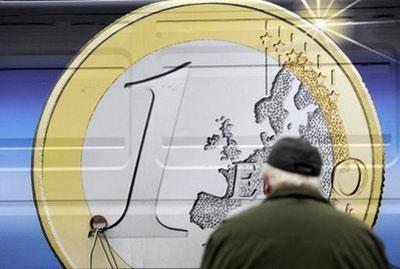Debt crisis heightens concern for EU
2010-02-07 12:58 BJT
From Greece to Spain, and now Portugal a government debt crisis is spreading along the Eurozone's periphery. It's increasing concerns over the stability of the monetary union that includes 16 European nations.
Since December 2009, the value of the euro has declined by more than 9 percent. Now, the world's only single currency zone is believed to be facing the biggest challenge in its 11-year history.
The Wall Street Journal says Greece and Spain have long been exposed to loose fiscal supervision and and face economic structural risks. The financial crisis has hit those weaknesses so hard, that the debts of those economies surged to a level far exceeding the EU's requirement.
 |
| A man looks at a representation of the Slovak edition of the euro. (AFP/File/Samuel Kubani) |
The New York Times believes the debt crisis is more than a sovereign or economic crisis saying it has become a political one.
This is because every other Euro Zone nation is busy coping with its own domestic fiscal difficulties, and can't afford to be decisive on political issues.
Editor: Zhang Pengfei | Source: CCTV.com
 Mail
Mail Share
Share Print
Print


 Video
Video









 2009 China Central Television. All Rights Reserved
2009 China Central Television. All Rights Reserved